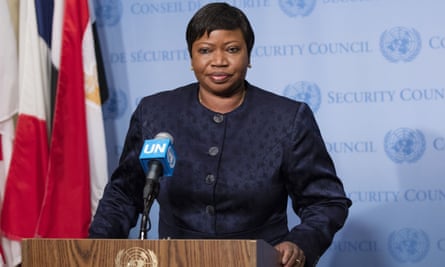The recent conviction of Ratko Mladić, the former Bosnian Serb commander, on charges of genocide, war crimes and crimes against humanity committed in the 1990s may come to be viewed as a high-point for global justice. Mladić’s life sentence for his leading role in ethnic cleansing operations in Bosnia, the battle for Sarajevo, and the massacre of Muslims at Srebrenica was fully deserved. But this symbolic success cannot hide the fact that the international criminal justice system is under siege from within and without. In 2017, its problems grew worse.
Mladić’s conviction followed the successful prosecution of another high-profile figure, the Bosnian Serb leader, Radovan Karadžić, in addition to nearly 160 other criminal indictees. All this is the work of the international criminal tribunal for the former Yugoslavia (ICTY), created by the UN security council in 1993.
At the time, there was scepticism that the new court could function while the war still raged. To this day, many people in the western Balkans remain critical of its performance. But broadly speaking, the ICTY – which will be dissolved at the end of this month – may be judged a success. It brought justice, if not perfect closure, where mayhem and murder once reigned unchecked.
The ICTY precedent has had an impact reaching far beyond south-eastern Europe. In 1994, the UN created a sister court – the international criminal tribunal for Rwanda – to prosecute those responsible for the genocide in that country. The “special court for Sierra Leone”, founded in 2002, was a variation on the theme. The ICTY measurably reinforced the concept of supranational justice applied over the heads, if need be, of national leaders and governments. And its inception undoubtedly smoothed the way for the founding, under UN auspices, of a permanent international criminal court (ICC) with global jurisdiction. The ICC is the world’s court of last resort, specifically tasked with investigating genocide, war crimes and crimes against humanity. It began work in The Hague in 2002, when the Rome statute came into force. It is backed by 123 state parties, including Britain, out of a possible total of 195. Member states voted last week to significantly widen its jurisdiction, from next year, to include state-on-state crimes of aggression.
So far, so good. Or perhaps not. From its earliest days, the ICC faced accusations that it was unduly focused on Africa, where nearly all its investigations have taken place. Fatou Bensouda, of Gambia, the current chief prosecutor, has worked to dispel these suspicions. But a degree of disillusionment persists. This year, Burundi became the first ever state to quit the court, claiming it was an “instrument of the west”. South Africa tabled legislation last week that, if enacted, would make good its previous threat to pull out. And African Union states have backed a non-binding proposal for mass withdrawal.
Bensouda has taken concrete steps to broaden the ICC’s scope. Relatively new “preliminary examinations” now include Afghanistan, Iraq, Palestine and Ukraine. This means American troops who have been fighting the Taliban, and killing Afghan civilians, inadvertently or otherwise, since 2001 are coming under belated legal scrutiny. Likewise, the actions of Israeli security forces in the occupied territories and Russian-backed troops in Ukraine will be examined. The behaviour of members of the British armed forces in Iraq following the 2003 invasion, the subject of much domestic litigation, forms part of another ICC examination.
There is much to investigate in all these situations. The question is whether the ICC can act effectively. Palestinian human rights groups, for example, submitted evidence to the ICC in September alleging war crimes and crimes against humanity by Israeli officials in the West Bank and Gaza. Last year, Human Rights Watch called on the ICC to investigate the 2014 Gaza war and the expansion of Jewish settlements, illegal under international law. But while the Palestinian Authority joined the Rome statute in 2015, Israel rejects ICC jurisdiction. Israeli nationals could, in theory, be prosecuted for crimes committed on Palestinian soil. But Israel’s government has no obligation to surrender them to the court. The US, China and Russia, which also boycott the ICC, afford similar protections to their nationals, wherever they may be, whatever they may do.
This continuing refusal of major global powers to support the international criminal justice system, represented at its apex by the ICC, seriously undermines its credibility. The failure of ICC members to enforce their own rules, as in the case of Omar al-Bashir, the Sudanese president indicted for genocide and war crimes in Darfur, has also done great damage. When Bashir visited South Africa in 2015, Jacob Zuma’s government ignored its legal obligations and declined to arrest him.

In her annual report this month, Bensouda said it was imperative to close what she called the impunity gap. “What is required, today more than ever, is greater recognition of the need to strengthen the court and the evolving system of international criminal justice. It is up to state parties, first and foremost, as custodians of the Rome statute, to stand firmly by its values and further foster its positive impact in practice,” she said.
The Mladić case aside, developments in 2017 suggest Bensouda’s call may fall on deaf ears. In Syria, not a state party to the ICC, horrific war crimes have continued unchecked. In the failed state of Yemen, also not a member, a similar tragedy has played out. Much of the killing in both countries can be attributed to Russian and Saudi forces, respectively, who are beyond the ICC’s purview.
In Myanmar, tens of thousands of Rohingya Muslims have suffered what the US terms ethnic cleansing – but neither the Trump administration, the UN, nor a hamstrung ICC have done much about it. The same goes for the North Korean regime’s systemic abuses of its citizens. The focus there is on missiles, not misery. In truth, Bensouda’s “impunity gap” widened into a chasm in 2017.
This ongoing failure to consistently and comprehensively pursue, prosecute and punish individuals guilty of the worst crimes known to humanity is universally shaming. It is reprehensible that great powers aspiring to global leadership, such as China and India, shirk their responsibilities with self-serving arguments about national sovereignty.
It is shocking that the US, a once proud beacon of liberty and justice, also continues to fail the international community in this regard. And it is unacceptable that notorious malefactors, such as Syria’s Bashar al-Assad, appear beyond the reach of the of the law. A special tribunal set up by the UN has been compiling reports on Syria for years. There is no shortage of damning evidence. But only the UN security council can refer Assad to the ICC. And it has not done so because Syria’s ally, Russia, would veto any such move.
The wider political environment has deteriorated, too. The rise of Donald Trump and inward-looking, nativist and populist forces in the western democracies has further undermined faith in transnational institutions such as the European court of justice and World Court.
Lack of leadership, lack of vision and lack of a sense of common purpose are among many contributory factors. But only one conclusion is possible. Nearly a century after the 1919 Paris peace conference set up a “Commission on the Responsibility of the Authors of the War and on Enforcement of Penalties”, it is a scandal that an under-powered, ill-supported international criminal justice system still struggles, and often fails, to bring the world’s worst offenders to book.
